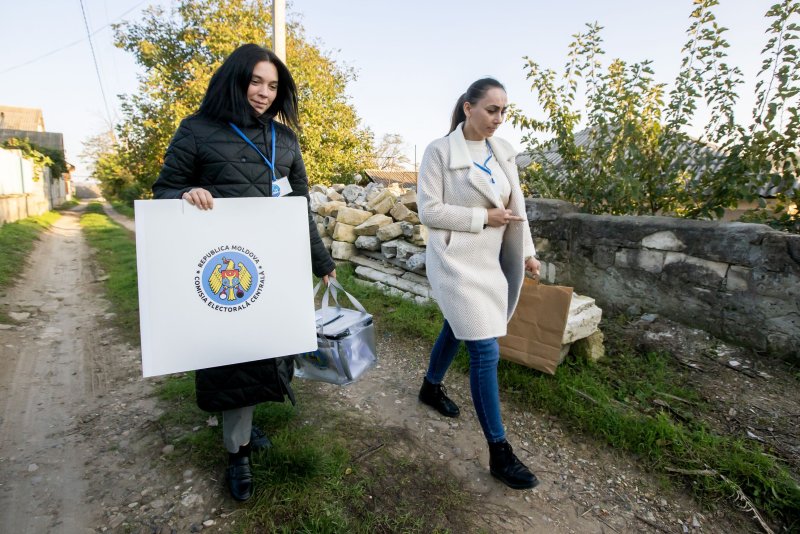Moldovan election workers with a mobile ballot box in Hrusevo village northeast of the capital, Chisinau, on their way to the homes of the elderly and others unable to get to vote in a twin presidential election poll and a referendum Sunday to amend the constitution to commit to joining the European Union. Preliminary results indicate a wafer-thin “yes” majority on the question of EU membership. Photo by Dumitru Doru/EPA-EFE
Oct. 21 (UPI) — Moldovans on Monday voted to join the European Union in a referendum decided by a narrow margin.
The final tally showed that 50.4% of voters approved the bid for EU accession while 49.6% were opposed, meaning a less than convincing mandate for whichever side ultimately prevails, official Central Election Commission of Moldova figures show.
The tiny landlocked country, bordered by Ukraine on three sides and Romania to the west, already internally riven by the pro-Russia breakaway Transnistria region where Russian boots are on the ground, has been caught up in a tussle for the hearts and minds of its 2.6 million citizens between Ukraine and its Western partners on one side and Moscow on the other.
Moldova’s pro-EU president, Maia Sandu, who won round one of a presidential election also held Sunday with 41% of the vote, alleged the close referendum outcome on whether to commit to joining the EU was down to an “unprecedented assault on democracy” orchestrated from outside the country.
“Criminal groups, working with foreign forces hostile to our national interests, have attacked our country with tens of millions of euros, lies, and propaganda, using the most disgraceful means to keep our nation trapped in uncertainty and instability,” she said in a post on X.
“We have clear evidence that these criminal groups aimed to buy 300,000 votes — a fraud of unprecedented scale. Their objective was to undermine a democratic process. Their intention is to spread fear and panic in the society.”
She did not directly refer to Russia but the Moldovan security agencies allege Russia has spent $108 million to get Moldovans to vote against closer ties with the EU and European lawmakers and elections monitoring groups have denounced what they say are widespread Russian vote-buying, cyber attacks and disinformation campaigns.
MEPs voted through a resolution Oct. 9 condemning the escalating actions, interference and hybrid operations of a “plethora of malicious actors, including pro-Russian Moldovan oligarchs and Russia’s state-funded RT network, in carrying out voter fraud schemes as well as cyber operations and information warfare.”
They also called for Russia to respect Moldova’s independence, cease provocations, withdraw its military forces and additional sanctions against individuals undermining Moldovan sovereignty.
On Oct. 14, Brussels blacklisted five Moldovan pro-Russia politicians and individuals and a non-governmental organization over involvement in destabilizing activities in Moldova by the Kremlin, 18 months after European lawmakers established a sanctions regime to target those undermining the sovereignty of the Balkan nation that many believe is at risk of the same fate as Ukraine.
EU foreign policy chief Josep Borrell said Molodova faced “massive direct” destabilizing attempts by Russia as well as challenges arising from the war going on next door in Ukraine.
Among those sanctioned was Evghenia Gutul, the governor of Gagauzia, an autonomous region that threatens to join Transnistria to become a second separatist, pro-Russian region of Moldova.
In June, the United States, Canada and Britain accused Russian actors of backing certain presidential candidates and distributing disinformation and propaganda “online, on the air and on the streets” to further their objectives.
“Part of these operations would include spreading lies about the incumbent president’s character and intentions and about supposed electoral irregularities,” the allies said.
Formal accession negotiations for Moldova to join the 27-member country political and economic bloc got underway in June after the EU said Moldova had met the required conditions to start talks about entry.
Neighboring Ukraine began its journey toward membership at the same time.
Entry to the bloc requires the approval of all of the existing 27 member nations.

